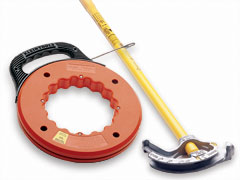Electrician
Electrician is a tradesperson specializing in electrical wiring of buildings, stationary machines, and related equipment. Electricians may be employed in the installation of new electrical components or the maintenance and repair of existing electrical infrastructure. Electricians may also specialize in wiring ships, airplanes, and other mobile platforms, as well as data and cable lines.
Types of Electricians[edit | edit source]
Electricians are typically divided into two main types: linemen and wiremen. Linemen, also known as outside electricians, work with electric utility company distribution systems at higher voltages. Their job involves ensuring that the electricity generated at power plants is safely transmitted through a network of substations and lines to customers. On the other hand, wiremen, or inside electricians, work with the lower voltages utilized inside buildings. They are trained to work in a variety of settings, including residential, commercial, and industrial.
Specializations[edit | edit source]
Within the wiremen category, there are further specializations, including:
- Residential electricians, who install wiring and troubleshoot electrical problems in homes.
- Commercial electricians, who work in offices and stores, installing power outlets and lighting.
- Industrial electricians, who install and maintain the electrical equipment used in industrial settings.
- Low-voltage electricians, who specialize in voice, data, and video (VDV) wiring or fiber optics.
Training and Regulation[edit | edit source]
The training required to become an electrician varies by country and state but typically involves a combination of formal education, apprenticeship, and licensure. In many areas, electricians are required to pass tests that demonstrate their knowledge of electrical theory, local and national electrical codes, and the National Electrical Code (NEC) in the United States.
Apprenticeship programs, often sponsored by electrical contracting companies, trade associations, or local union chapters, combine on-the-job training with classroom instruction. These programs typically last four to five years, and apprentices earn wages while learning their trade.
Safety[edit | edit source]
Working with electricity can be dangerous, so electricians must follow strict safety standards and regulations to protect themselves and the public. The use of Personal Protective Equipment (PPE), such as gloves and hard hats, is mandatory in most settings. Electricians must also be knowledgeable about lockout-tagout procedures and other safety protocols to prevent electrical accidents.
Tools and Equipment[edit | edit source]
Electricians use a variety of tools to perform their work, including screwdrivers, wire strippers, drills, and saws. They also use specialized equipment, such as ammeters, voltmeters, and oscilloscopes, to test connections and ensure the safety and efficiency of electrical systems.
Career Outlook[edit | edit source]
The demand for electricians is expected to grow in the coming years, driven by the increasing need for wiring in homes and businesses, the expansion of alternative power sources, and the maintenance of existing electrical infrastructure. According to the Bureau of Labor Statistics, job opportunities for electricians are projected to grow faster than the average for all occupations.
Conclusion[edit | edit source]
Electricians play a crucial role in building and maintaining the electrical infrastructure that powers modern society. Their work requires a combination of technical knowledge, practical skills, and adherence to safety practices. As technology evolves and the demand for electrical services grows, the role of the electrician will continue to be vital to the development and maintenance of electrical systems worldwide.
Search WikiMD
Ad.Tired of being Overweight? Try W8MD's physician weight loss program.
Semaglutide (Ozempic / Wegovy and Tirzepatide (Mounjaro / Zepbound) available.
Advertise on WikiMD
|
WikiMD's Wellness Encyclopedia |
| Let Food Be Thy Medicine Medicine Thy Food - Hippocrates |
Translate this page: - East Asian
中文,
日本,
한국어,
South Asian
हिन्दी,
தமிழ்,
తెలుగు,
Urdu,
ಕನ್ನಡ,
Southeast Asian
Indonesian,
Vietnamese,
Thai,
မြန်မာဘာသာ,
বাংলা
European
español,
Deutsch,
français,
Greek,
português do Brasil,
polski,
română,
русский,
Nederlands,
norsk,
svenska,
suomi,
Italian
Middle Eastern & African
عربى,
Turkish,
Persian,
Hebrew,
Afrikaans,
isiZulu,
Kiswahili,
Other
Bulgarian,
Hungarian,
Czech,
Swedish,
മലയാളം,
मराठी,
ਪੰਜਾਬੀ,
ગુજરાતી,
Portuguese,
Ukrainian
Medical Disclaimer: WikiMD is not a substitute for professional medical advice. The information on WikiMD is provided as an information resource only, may be incorrect, outdated or misleading, and is not to be used or relied on for any diagnostic or treatment purposes. Please consult your health care provider before making any healthcare decisions or for guidance about a specific medical condition. WikiMD expressly disclaims responsibility, and shall have no liability, for any damages, loss, injury, or liability whatsoever suffered as a result of your reliance on the information contained in this site. By visiting this site you agree to the foregoing terms and conditions, which may from time to time be changed or supplemented by WikiMD. If you do not agree to the foregoing terms and conditions, you should not enter or use this site. See full disclaimer.
Credits:Most images are courtesy of Wikimedia commons, and templates, categories Wikipedia, licensed under CC BY SA or similar.
Contributors: Prab R. Tumpati, MD





